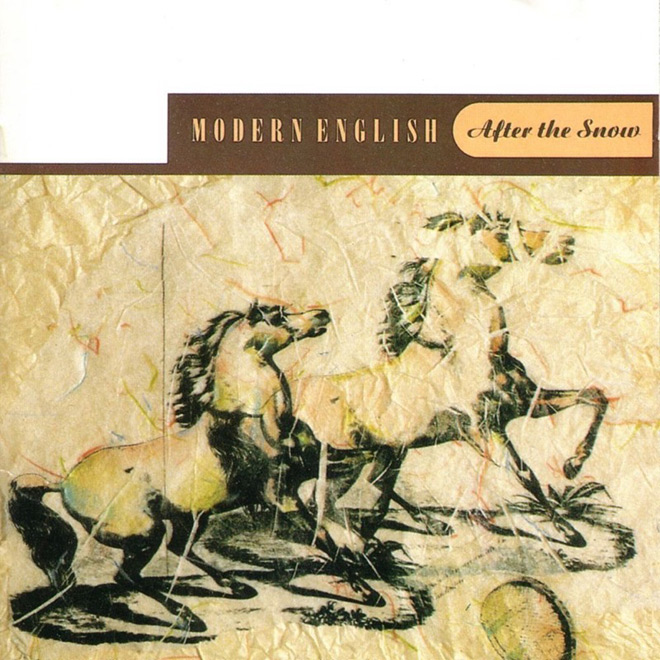 Modern English is a band regarded as popular and obscure at the same time. Popular because their 1982 single “I Melt with You” remains to this day a worldwide radio regular and film soundtrack staple.
Modern English is a band regarded as popular and obscure at the same time. Popular because their 1982 single “I Melt with You” remains to this day a worldwide radio regular and film soundtrack staple.
Obscure, for many people remember the song but not the album where it came from nor the name of the band itself—Modern English and its music deserve more than what it had earned over the years. So, give them a lot of love by playing their songs and rediscovering what made them iconic and great in the first place. And what fitting time could it be but right now, before the year ends, starting with the band’s sophomore oeuvre, After the Snow, which turned thirty-five this year.
Modern English was formed in Essex, England, in 1979. It may have eventually become more known especially in the 1980s as a Pop-leaning New Wave group alongside the likes of A Flock of Seagulls (“Space Age Love Song”), ABC (“Poison Arrow”), Duran Duran (“New Moon on Monday”), and Kajagoogoo (“Ooh to Be Ah”); but it actually started as a Gothic-sounding band in the league of Joy Division (“She’s Lost Control”) and Bauhaus (“Bela Lugosi’s Dead”).
Still up and running, after its main members re-formed in 2010, Modern English has eight studio albums under its name, from the Post-Punk Gothic Mesh & Lace of 1981 to the latest, back-to-original-form Take Me to the Trees of 2016. However, 1982’s After the Snow remains to be the English band’s most pivotal work for it was a sonic documentation of Modern English’s transitional phase—the period when its music slowly and gracefully emerged from the dark and cold trappings of its Gothic origin and eventually climbed out of it, to welcome the ebullient and summery embrace of Pop music.
Released on May 3, 1982, on 4AD Records, After the Snow opened with the tribal and angular call of “Someone’s Calling,” whose blend of Gothic and Pop sensibilities were already rendering celebratory results right from the start. However, the pull of Gothic’s dark and cold allure was still strong in the ensuing stompers – the galloping “Life in the Gladhouse” and the ominous “Face of Wood.” The following “Dawn Chorus” was the actual start of the band’s donning of New Romanticism, owing to its dramatic intro that was comprised by a beautiful patchwork of woven guitar plucks, undulating bassline, and sparse synthesizer melody.
Now, the sun and the stars had come, both elegant in their brightness and splendor. The song that launched Modern English to the endearment of the New Wave human race begun to play next; the track that fully realized the then fledgling band’s transformation from darkness to light, gloom to days, and bright summer rays after the frigid winter snow—“I Melt with You.” The brooding lyrical theme laid beautifully on a mesh and lace of instrumentation that was upbeat, intricate, melodic, catchy, danceable, and engaging, all at the same time. After basking in the light of this glorious song, Modern English dove once again towards the spacey cliff of the title track, which further exhibited its propensity for the chorus- and flanger-drenched sound of the bass, serving as the trademark backbone of many of its songs in its entire catalog.
The penultimate track, “Carry Me Down,” with its woodwind and string arrangement, was another prelude to what the listener would be treated to subsequently in Ricochet Days – the 1984 follow-up that saw Modern English in its best New Romantic predisposition, in full regalia and classic nostalgia. Finally, Modern English closed After the Snow with a rather frenetic, wiry, and pulsating uptempo in the form of “Tables Turning,” which waved, spiked, and rippled gloriously towards the end. No tables left unturned, indeed… in the matter of style and in a manner of speaking.
Modern English is currently comprised by the reunited original members Robbie Grey (vocals), Gary McDowell (guitar, vocals), Michael Conroy (bass, vocals), and Stephen Walker (keyboards) with additional musicians Steven Walker (guitar) and Roy Martin (drums). The reinvigorated group has been busying themselves with tours primarily in promotion of their latest oeuvre, 2016’s Take Me to the Trees, and also to deliver the rest of their time-wrought music to both longtime fans and younger hipsters of this generation.
In the meantime though, revisit the band’s summery escape After the Snow, which still sounds fresh and refreshing… and connects well to what the band is currently doing… thirty-five years after they first melted the hearts of many in bittersweet surrender, with the sound and melodies of their timeless music.







No comment